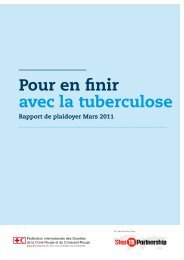Thailand - Stop TB Partnership
Thailand - Stop TB Partnership
Thailand - Stop TB Partnership
Create successful ePaper yourself
Turn your PDF publications into a flip-book with our unique Google optimized e-Paper software.
the general budget for primary health care and subject to reallocation. 29 According to one<br />
regional <strong>TB</strong> official, “We need someone to show the flag. . . . If we have political commitment<br />
at the highest levels, then district-level officials and provincial-level examiners will<br />
be more cooperative; but if <strong>TB</strong> isn’t on the ‘priority list’ of health inspectors, district and<br />
provincial officials will not make a commitment to <strong>TB</strong> work.” 30<br />
The NTP should develop innovative ways of encouraging a greater level of accountability<br />
for performance on <strong>TB</strong> control efforts among health officials. For example, one<br />
national <strong>TB</strong> official suggested that publicizing regional and district case detection and treatment<br />
success rates on the NTP website might be “one way to stir things up.” 31 Providing<br />
feedback to health officials at these levels would increase their awareness of how the statistics<br />
they compile contribute to <strong>TB</strong> control efforts and enhance their sense of engagement<br />
in a common, national cause. Another regional <strong>TB</strong> official suggested developing a “traffic<br />
signal” system, which would award districts red, yellow, and green lights based on performance<br />
as a way of creating competition among them to achieve better results. 32<br />
There are few nontraditional actors involved in the development of <strong>TB</strong> control<br />
policy. This contributes to a sense that <strong>TB</strong> control is best left to the specialists, limits the<br />
level of “political buy-in” from other government ministries, and reduces the likelihood<br />
that public pressure will play a role in prompting more effective government action. As one<br />
activist puts it: “Designing plans for <strong>TB</strong> control should involve all stakeholders, but this is<br />
something I haven’t seen yet. . . . If we compare <strong>TB</strong> policy to a tree, and the managers are<br />
on top, we might have to find stakeholders to shake the tree—to shake the whole tree, but<br />
not too hard; otherwise it will fall down.” 33<br />
The NTP should expand its efforts to involve a broader range of stakeholders,<br />
including recovered patients and community health activists, in <strong>TB</strong> policy development<br />
and implementation. This could help generate a greater shared sense of commitment to<br />
<strong>TB</strong> control efforts, and greater public pressure for more effective <strong>TB</strong> and <strong>TB</strong>/HIV services.<br />
Public mobilization<br />
Public awareness of the threat posed by <strong>TB</strong> is generally low. <strong>TB</strong> is widely viewed as a curable<br />
but rare disease, while HIV/AIDS is seen as a fatal disease deserving more attention. 34<br />
NTP media outreach efforts have been minimal, particularly when compared to the scope of<br />
national campaigns around HIV/AIDS. In the absence of easily accessible, accurate information<br />
about <strong>TB</strong> and <strong>TB</strong>/HIV, local organizations lack the resources and knowledge to educate<br />
their communities, 35 and stigmatization of people living with <strong>TB</strong> and <strong>TB</strong>/HIV continues to<br />
be an issue of concern.<br />
42<br />
<strong>TB</strong> POLICY IN THAILAND



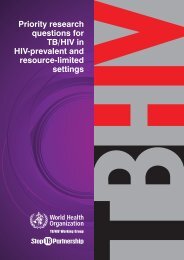

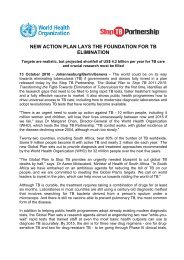

![Global Drug Facility Annual Report 2011 [.pdf] - Stop TB Partnership](https://img.yumpu.com/26788745/1/184x260/global-drug-facility-annual-report-2011-pdf-stop-tb-partnership.jpg?quality=85)

![Concept note on national stop TB partnership [.pdf]](https://img.yumpu.com/26788741/1/184x260/concept-note-on-national-stop-tb-partnership-pdf.jpg?quality=85)

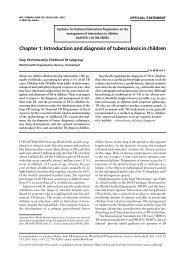
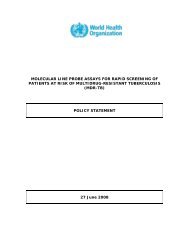
![2005 and Challenges for 2006 - 2015 [.pdf] - Stop TB Partnership](https://img.yumpu.com/26788674/1/190x245/2005-and-challenges-for-2006-2015-pdf-stop-tb-partnership.jpg?quality=85)
![Brochure (French) [.pdf] - Stop TB Partnership](https://img.yumpu.com/17234792/1/190x91/brochure-french-pdf-stop-tb-partnership.jpg?quality=85)

